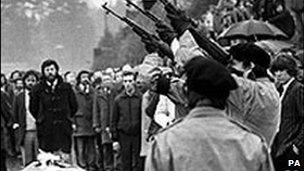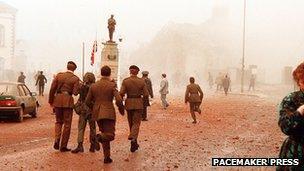Thatcher's tenure shaped by Ireland
- Published
Mark Devenport looks back at Margaret Thatcher's links with Northern Ireland
Margaret Thatcher, who has died following a stroke, came to office as British prime minister with Ireland nowhere near the top of her list of priorities.
But she found that somehow Irish affairs demanded her attention, helped to define the age she dominated and were to play a role in determining how history remembers her.
Republicans saw her as an enemy from the very start.
In the months before she took office, an INLA car bomb killed her close political ally Airey Neave as he drove out of the underground car park at the Palace of Westminster.
Neave, a former intelligence officer who once escaped from the Nazi prison camp at Colditz, believed in taking much tougher security measures against republican paramilitaries in Northern Ireland.
It was a view that fitted in with Mrs Thatcher's own and may well have helped to shape it.
Union belief
The great irony of her period in office is that she managed to alienate unionists too, even though she will probably turn out to be the last prime minister of the UK to have had old-fashioned unionist instincts.
She was always ready to point out that the official title of the party she led was "Conservative and Unionist" - just as she was herself.
This was a woman to whom Northern Ireland was every bit as British as her Finchley constituency.

Signing the Anglo-Irish Agreement with Garret FitzGerald in 1985
Whatever narrative thread you follow through her years in office - radical economic change, her struggle with trade unionism, or the battle for the Falklands and the fallout from that - events in Ireland are always there in the background.
As she was settling into office, a series of IRA murders claimed the Queen's cousin Lord Mountbatten and killed 18 British soldiers in a single day.
The Troubles were at their height, and in Margaret Thatcher the IRA found an implacable foe.
She was convinced that any settlement would have to include a decisive and lasting victory for the security forces over the IRA.
Uncompromising
It was the hunger strike in 1981 which defined her attitude towards republican violence.
Inside the Maze Prison complex near Lisburn in County Antrim, republican paramilitary prisoners were engaged in a long campaign to secure a set of privileges which would, in effect, have given them prisoner-of-war status.
It was a dispute that went to the heart of The Troubles - were imprisoned members of the IRA terrorist murderers, or guerrilla fighters whose actions in pursuit of their cause were legitimate?
Margaret Thatcher was in no doubt.

Bobby Sands's funeral. He was one of 10 hunger strikers to die
"Crime is crime is crime. It is not political," she said, as the republican prisoners, one by one, starved themselves to death.
To her supporters, it was exactly the kind of uncompromising stand on a matter of principle that made her great.
To many in Ireland, it was a display of brutal inflexibility that the deaths of 10 of the hunger strikers over a period of months did nothing to soften.
She became a figure of hate to Irish republicans - and in 1984 they tried, with devastating consequences, to assassinate her.
Security backing
An IRA bomb exploded at the Conservative Party conference in Brighton, killing four delegates and seriously injuring many others.
But Mrs Thatcher survived - and so did her unwavering determination to give the security forces the political support and the equipment they needed to crush republican terrorism.
To persuade the Irish government in Dublin to improve security co-operation and extradition arrangements, she signed the Anglo-Irish Agreement in 1985.
It was a curious step, which she took against her own political instincts, as it enshrined the right of the Irish Republic to a role in the affairs of Northern Ireland.

She narrowly escaped death in an IRA attack on her Brighton hotel in 1984
Unionists in the province, who should have been natural allies of Margaret Thatcher, were furious and began a campaign of street protests to attempt to overthrow the agreement.
Mrs Thatcher, already a figure of hate to one side in Northern Ireland, had now alienated the other.
The Anglo-Irish Agreement was a substantial political achievement in many ways and helped to pave the way for the improved relationships that eventually gave birth to the peace process.
But it was not an achievement of which Margaret Thatcher was proud - in her memoirs she wrote of how she had been misled about the likely extent of unionist anger it would provoke.
Defining moment
The events of 1987 summed up the atmosphere of the Thatcher years in Northern Ireland.
In May, British SAS commandos shot dead eight IRA members at Loughgall in County Armagh as they set out to ambush two officers in a sleepy part-time rural police station.
Six months later, 11 civilians were killed when a no-warning IRA bomb exploded as they gathered for a Remembrance Day service at Enniskillen in County Fermanagh.
Mrs Thatcher's belief in the use of tough tactics never wavered - in 1988 she introduced a broadcasting ban which made it illegal to broadcast the views of the likes of Sinn Fein, "to deny terrorists the oxygen of publicity on which they thrive".

Eleven people died in the 1987 Enniskillen Poppy Day bombing
That, remember, is just 10 years before one of her successors signed the Good Friday Agreement - a document which made it British policy to create political institutions where Sinn Fein would share power with Northern Ireland's other main political parties.
Mrs Thatcher, it was clear, was not enthusiastic about the messy political compromises that the peace process required.
'Bulwark against terrorism'
She once said that she did not see why one should make concessions in order to persuade people to honour commitments they had already given - a phrase that might almost describe the approach to peace-making of the administrations that followed her.
But we cannot judge politicians by the standards of other ages; only by the standards of the ages in which they lived and governed.
In Irish affairs Margaret Thatcher was a tough and uncompromising believer in the Union, and instinctively loyal to the security forces she saw as society's bulwark against a slide into the anarchy of terrorism.
She was hated by republicans and despised them in return, and her blunt-speaking style won her few friends on either side of the border, even if many had a sneaking admiration for her status on the world stage.
If it never seemed likely that British policy would be overturned by violence on her watch, it never seemed likely either that the path to a more peaceful overall solution would be found.
- Published8 April 2013